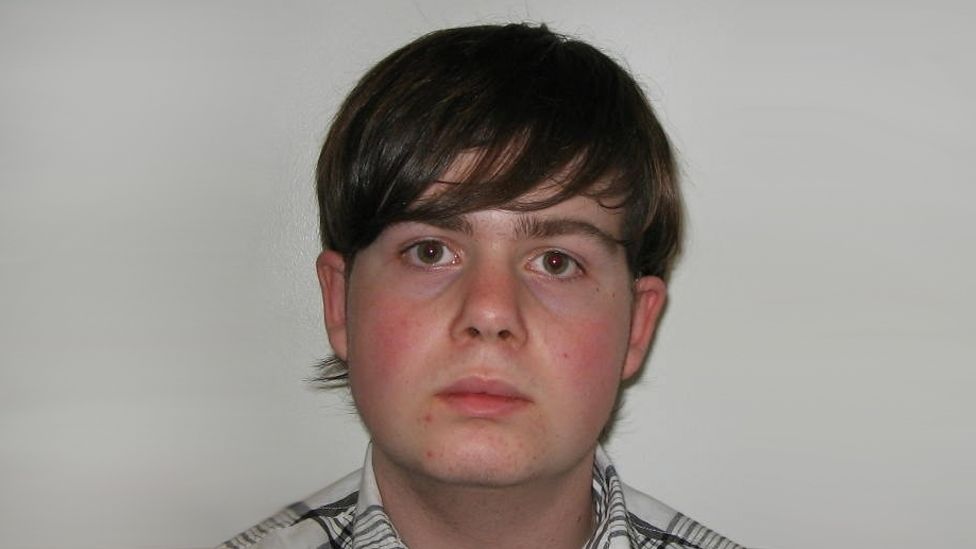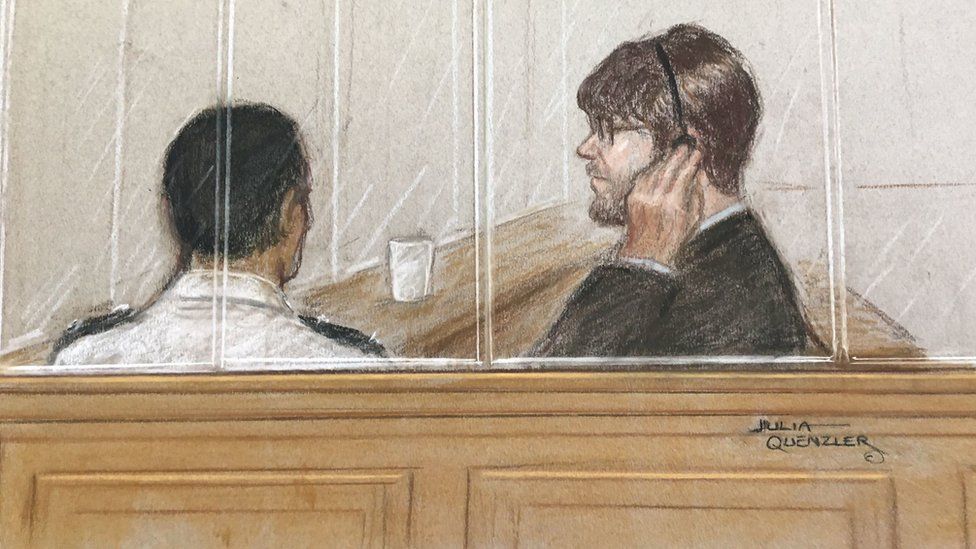This video can not be played
To play this video you need to enable JavaScript in your browser.
A "very damaged man" has been jailed for killing his bedbound grandfather in a knife attack, in the first filmed sentencing in England and Wales.
Ben Oliver, 25, stabbed his 74-year-old grandfather to death in Mottingham, south east London, in January 2021.
He admitted manslaughter due to diminished responsibility. He was cleared of murder at the Old Bailey.
Judge Sarah Munro QC made legal history as she handed him a life sentence with a minimum of 10 years and eight months.
The arrival of TV cameras at the Old Bailey and other crown courts comes nine years after the move was first promised.
The major change in the law, announced on Wednesday, allows broadcasters to film judges sentencing serious criminals. Broadcasting an entire trial will not be permitted.

During sentencing, Oliver, of Bexleyheath, south London, was denied a hospital order because he "presents a significant risk to the public", the court heard.
He attacked his bedbound grandfather, David Oliver, as he lay "helpless" in his bedroom following a stroke, jurors heard during the trial.
David Oliver was found with 21 stab wounds to the face and seven stab wounds to the torso.
Louis Mably QC, for the prosecution, said: "It was a brutal attack, plainly carried out with the intention of killing him."
The defendant had become "very angry" after learning of allegations against his grandfather of historic sexual abuse of girls, Mr Mably said.

TV cameras in England and Wales criminal courts
Under new rules announced on Wednesday the BBC, ITN, Sky and Press Association can ask to film sentencing of a defendant - the very last stage of a criminal prosecution.
Sentencing hearings are witnessed daily by journalists, juries, victims or their families. But until now they are little understood by the public because the detail is often simplified in daily news reporting.
Under these new rules, each sentencing that is filmed will be kept on YouTube so viewers can see the judge's full reasoning.
Cameras will not be allowed to film victims, witnesses and jurors amid concerns that wider televising of trials could damage the quality of evidence or sensationalise cases.
A law from 1925 bans all other filming in crown courts.
Justice Secretary Dominic Raab said: "Opening up the courtroom to cameras to film the sentencing of some of the country's most serious offenders will improve transparency and reinforce confidence in the justice system.
"The public will now be able to see justice handed down, helping them understand better the complex decisions judges make."
In Scotland, which has its own legal system, filming has been allowed in criminal courts since 1992.
Although full trials are rarely broadcast because of strict rules, broadcasting of sentencing in major cases has been fairly common since 2012.

Jurors were told the grandson had autism which, combined with other emotional and mental factors, diminished his responsibility for the killing.
Due to his condition, he "did not think there was an alternative to killing his grandfather", Judge Munro said.
In 2016, Ben Oliver was convicted of sexual offences against a young girl when he was aged 15, the court was told.
Ms Munro said this was "learned behaviour from your own childhood".
His step-dad was "extremely cruel" and physically violent towards him, the court heard.
The man, named only as Steve in court, subjected Ben Oliver "to a sexualised environment", and introduced him to child pornography at the age of five.
Psychologists appointed by the court described Oliver as "a very damaged man who will require psychological work in the longer term", Judge Munro said.

In the months before the killing, he had become aware of allegations of sexual abuse against his grandfather, who was also said to have mistreated his wife and had affairs, jurors were told.
His grandmother told him she could not have peace until her husband had died.
The defendant was also depressed and had attempted suicide several times, jurors heard.
Mr Mably said: "He was a troubled and angry young man."


Every day, reporters, victims or their families listen to a judge delivering a sentence. This is often a lengthy analysis of a crime, the defendant's culpability, and the harm they have caused - along with the mitigating factors in their often sorry lives.
In short, jailing criminals is simply not a case of plucking the first number of years that comes to mind.
There is only so much that reporters like me can say on any given day about a particular case. We inevitably have to gloss over some of the details.
This major reform, in favour of greater transparency, fills that gap.
For the first time, the public will be able to watch a judge performing their work in full, in the name of public protection.
And anyone who watches the cases as they begin to be published on YouTube will soon see how this complex public duty is a world away from TV dramas or simplistic headlines.

Follow BBC London on Facebook, Twitter and Instagram. Send your story ideas to hellobbclondon@bbc.co.uk
Related Internet Links
https://news.google.com/__i/rss/rd/articles/CBMiM2h0dHBzOi8vd3d3LmJiYy5jb20vbmV3cy91ay1lbmdsYW5kLWxvbmRvbi02MjMzMjgyNNIBN2h0dHBzOi8vd3d3LmJiYy5jb20vbmV3cy91ay1lbmdsYW5kLWxvbmRvbi02MjMzMjgyNC5hbXA?oc=5
2022-07-28 16:14:27Z
1515803930
Tidak ada komentar:
Posting Komentar